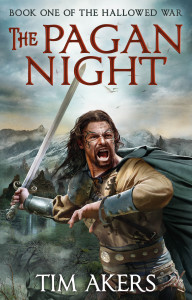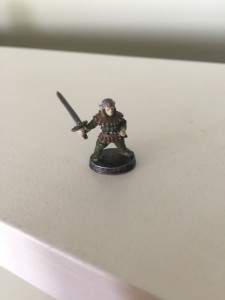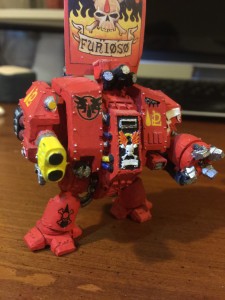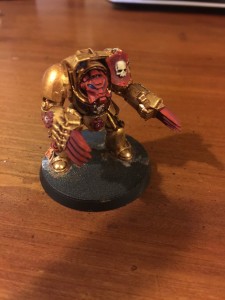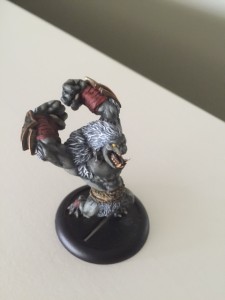Character Creation
I’m in a strange lull right now. The Pagan Night is with the copyeditor. ARCs are being printed, but have not yet arrived. The outline for book two in the series is on my editor’s desk, but actual writing can’t begin until that’s approved. I have more time to read, but still want to spend part of my day writing. So what to do?
What you do in this situation is work on getting better. While talking to a good friend of mine, I expressed frustration at how each stage of my writing always feels rushed. I spend a lot of time looking at the mistakes in a book and trying to find some way to patch them up, always thinking “Well, hopefully I’ll do this better on the next book.” And, frankly, I get frustrated that I’m not yet as good of a writer as I want to be, which is probably something most writers feel. We started talking about perceived weaknesses, and he was able to outline for me a couple things that I should be working on. And now we’re engaging in a series of exercises aimed at improving those weaknesses.
The biggest in my mind is character development. I have this tendency to develop a world, and then a plot, and then the characters necessary to fulfill that plot. I would like to work in the opposite direction, but it’s tough when your first instinct is world creation.
For the first installment of this exercise I wrote a scene with a character I knew nothing about, in an empty world. I was intentionally leaving out fantastical elements, because as soon as I drop any of that stuff into the narrative I immediately start to spin the world up, and that can change the character. Here’s the result.
“I don’t think that matters.”
“I do. I think it’s the only thing that matters,” Frank said.
“Sure. Sure you do,” he answered. The man in the hood turned away from the river, rubbing his face. “But I don’t think it matters right now.”
They were quiet for a long moment, listening to the waves slap against the pier, watching the city lights dance across the waves. Frank stretched his hands, balling them into fists and cracking his knuckles. They were getting nowhere.
“Let’s just forget it. They’ll bring the boxes or they won’t, they’ll honor the deal or they won’t.” Frank folded his hands beneath his coat, fiddled with his belt, then lay his palms flat against his thighs. The scarred mass of his knuckles hung like tree roots from the tailored cuff of his suit. New suit, new city, new worries. “So what can we do?”
The man, unknown to Frank before this morning’s call, let out a long and withering sigh. He turned back to the river. Frank caught a glimpse of black eyes, black hair. The moon flashed off his smile.
“Plan as if the box is lost. Assume we’ve already been burned,” he said.
“You know something I don’t.” Not a question.
“No.”
“If the box is gone then we should be gone. There’s nothing to plan. If the box is gone then we stop having this conversation and we leave. Quickly.”
“And how would you do that?” the man asked.
“Seriously? You need instruction on how to stop talking? You just… fucking…” Frank realized his fists were bumping together again, the meat of his knuckles clumping loudly against his scarred wedding ring. He took a deep breath and smoothed out the creases of his jacket, pressing damp palms into the still-slick fabric. “You stop talking and you disappear. The second you know this deal is fucked, that’s what we do. So if you know something…”
The man made an elaborate gesture with his thin fingers, a glitter of rings along his knuckles, all silver and gold.
“You need to be ready for betrayal. That is all I want from you, today.” The man’s pronunciation was sparkling, as though he were a virtuoso in enunciation, and wished to showcase his talents. “An assurance that, if everything goes to shit, you will be able to disappear. Because if they do not bring the box, the best thing for me is that you are never found.”
“By them?” Frank asked. “Or by you?”
“I do not make threats.”
“Only promises?” Frank laughed. “Fucking bosses and their fucking promises.” He waved his hand, the wide fan of his fingers bent and crooked. “Leave that to me. I’ve fallen out of more cities than you’ve seen, mister. Things go south, I’ll be fine.”
The man was still for a moment, bent toward the river like a heron, the peaked cap of his hood nodding slowly. Finally he laughed.
“Very well. Alexander will be in contact. Not before Sunday, but no later than Tuesday. Anyone comes to you outside of that time, assume they’re trying to kill you.”
“I don’t know anyone named Alexander.”
“Alexander knows you.” The man raised a pipe from his pocket, tapping the bowl against his sleeve. The air immediately smelled of roasted apples and ash. “Let us not forget the purpose of our deal, Mr. Franklin.”
“Right,” Frank said. He spat into the river and turned down the bank. “See you later.”
“Gods pray not,” the man said, then disappeared.
It’s a very modern situation, with a few fantastic elements. But you can see that dialog is my primary entry into character, along with some description tags. Things like Frank’s scarred wedding ring, his crooked fingers, nervous hands and suit so fresh that the creases are still in all communicate the character without saying anything specific. I feel like it’s a good scene.
For the second exercise I started including fantasy elements without overwhelming the character. I stayed in the same character-space while leaving Frank behind. I think the differences are clear. Here it is.
Cassus stood in front of the mirror, carefully disentangling his fingers from the rings of his bondspirit. Long, clotted streamers of blood dragged from the teeth of each ring as he twisted them free. He dropped them into a pewter bowl filled with ice wine, the pale golden surface quickly clouding into rust.
“It went well?” Lorren called from the other room. The last ring plopped into the wine, taking the final measure of Cassus’ sacrifice.
“He will do. Without trust or loyalty, but he knows his job.” Cassus dipped his hands into a different bowl, this one of chilled water and rum, wincing as the spirit stung his wounds. He dried his hands and turned to face the door. The room was crowded with trunks, each overstuffed with books and clothes and the remnants of a larger life. Lorren’s shadow moved against the white tiles of the bathroom. “The product of a wretched life, that one.”
“A wretched life is a better education than most schools,” Lorren said. He came into the room dressed in embroidered silk, his hair freshly oiled and black as a raven’s wing. Cassus suspected the poor man had started dying his precious locks, though he would never mention this. Lorren frowned when he saw the bowl of wine and blood, and the awkward way Cassus was holding his hands, palms up, fingers curled delicately around the injury.
“I hate those things,” Lorren hissed, hurrying forward to take Cassus’ hands in his own, rubbing thumbs into palms, tutting all the while. “I wish you could leave them somewhere else.”
“And where would I leave them?” Cassus asked quietly. “Not like I can call the butler and have him store them with the rest of the silver. Besides,” he gently pulled his hands free and slid past Lorren. The smell of the man’s hair, rich as mahogany, wafted through the air. “They ask little enough of me these days. Just happy for a home, I think.”
“Yes, well. Anyway.” Lorren drifted to the vanity and dropped a silk kerchief over the bowls, hiding the blood and silver. “Do you ever wonder what became of Hammond? A good man, and loyal. I would hate to think of him out of work because of us.”
“You were always so kind, my dear. I’m sure he’s fine,” Cassus said. He knew that Hammond had slid smoothly into the service of a barrow merchant upriver, even with the stain of House Frael on his record. Cassus had tracked all the servants of his former estate far enough to know they weren’t vulnerable to bribes or the temptation of treachery. He had removed those few who had fallen too far to be trusted. “Have you already taken your dinner?”
“Yes, sorry. But I put some aside for you.” Lorren went to a cabinet by the door and removed a tray covered in silk. He arranged two of the wayward trunks to form a table then pulled a chair from the corner and motioned for Cassus to sit. He did, and Lorren swept the silk away to reveal a bowl of cream soup and an apple. “Not the Kelling’s, but still a good soup. I’m afraid it might have cooled a bit.”
“I prefer it cold,” Cassus said.
“Wait, wait,” Lorren said, fluttering Cassus’ hand away from the spoon and disappearing into the other room. He returned a second later with a small vase, which he set beside the soup with a flourish. Then he produced a folded paper rose from his sleeve, bowing has he balanced it in the vase. “There. Ideal.”
“Lorren!” Cassus said. He plucked the rose up and turned it in the light. It had been made from a waxed candle wrapper, the chandler’s logo tucked into the delicate petals. “You made this?”
“I have to do something with my time,” Lorren said demurely, a slight blush on his cheeks. “And you’re always so glum after these sorts of meetings.”
“How could I ever be glum?” Cassus asked. He set the rose on the table and drew Lorren’s face to his own. “Where is there room in my life for tears, with such a rose in my heart?”
Lorren laughed and pushed him away. “Eat your soup, and think no more of this business. You’re too kind for such things.”
Cassus smiled, tucking into the soup. It was good, even cold.
Again, character names and things like the bonded rings say something about the world, but not as much as they say about the character. And I tried to say a lot about the character without yelling.
This is a good exercise, and one I recommend. Another dozen or so of these and I may have a story. But more importantly, I’ll have a character.

